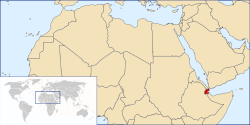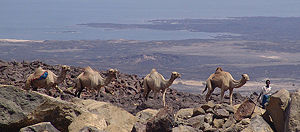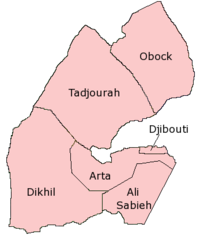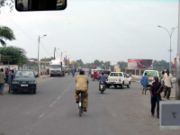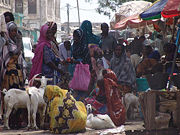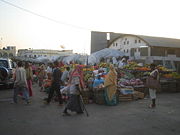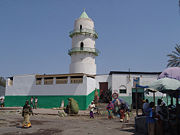Djibouti
2008/9 Schools Wikipedia Selection. Related subjects: Africa; African Countries
| جمهورية جيبوتي Jumhūriyyat Jībūtī Jamhuuriyadda Jabuuti République de Djibouti Republic of Djibouti
|
||||||
|---|---|---|---|---|---|---|
|
||||||
| Anthem: Djibouti |
||||||
|
|
||||||
| Capital (and largest city) |
Djibouti |
|||||
| Official languages | Arabic and French | |||||
| Recognised regional languages | Afar, Somali | |||||
| Demonym | Djiboutian | |||||
| Government | Parliamentary republic | |||||
| - | President | Ismail Omar Guelleh | ||||
| - | Prime Minister | Dileita Mohamed Dileita | ||||
| Independence | from France | |||||
| - | Date | June 27, 1977 | ||||
| Area | ||||||
| - | Total | 23,200 km² ( 149th) 8,958 sq mi |
||||
| - | Water (%) | 0.09 (20 km² / 7.7 sq mi) | ||||
| Population | ||||||
| - | July 2007 estimate | 496,374 ( 160th) | ||||
| - | 2000 census | 460,700 | ||||
| - | Density | 34/km² ( 168th) 88/sq mi |
||||
| GDP ( PPP) | 2005 estimate | |||||
| - | Total | $1.641 billion ( 164th) | ||||
| - | Per capita | $2,070 ( 141st) | ||||
| HDI (2007) | 0.516 (medium) ( 149th) | |||||
| Currency | Franc ( DJF) |
|||||
| Time zone | EAT ( UTC+3) | |||||
| - | Summer ( DST) | not observed ( UTC+3) | ||||
| Internet TLD | .dj | |||||
| Calling code | +253 | |||||
Djibouti (Arabic: جيبوتي Jībūtī, Somali: Jabuuti), officially the Republic of Djibouti, is a country in the Horn of Africa. Djibouti is bordered by Eritrea in the north, Ethiopia in the west and south, and Somalia in the southeast. The remainder of the border is formed by the Red Sea and the Gulf of Aden. On the other side of the Red Sea, on the Arabian Peninsula, 20 kilometres (12 mi) from the coast of Djibouti, is Yemen. The capital of Djibouti is the city of Djibouti.
History
The history of Djibouti as recorded in poetry and songs of its nomadic people, goes back thousands of years to a time when Djiboutians traded hides and skins for the perfumes and spices of ancient Egypt, India, and China. Through close contacts with the Arabian peninsula for more than 1,000 years, the Somali and Afar tribes in this region became among the first on the African continent to accept Islam.
French interest developed in the nineteenth century when the area was ruled by the sultan of Raheita, Tadjoura and Gobaad. The French purchased the anchorage of Obock in 1862 and expanded it eventually to a colony called French Somaliland with essentially the current boundaries. In 1967 the area became the French overseas territory of the Afars and Issas.
The Republic of Djibouti gained its independence from France on June 27, 1977. Djibouti is a Somali, Arab and Islamic country which regularly takes part in Islamic affairs as well as Arab meetings.
Politics
Djibouti is a semi-presidential republic, with executive power in the central government, and legislative power in both the government and parliament. The parliamentary party system is dominated by the People's Rally for Progress and the current President is Ismail Omar Guelleh. The country's current constitution was approved in September 1992. Djibouti is a one party dominant state with the People's Rally for Progress in power. Opposition parties are allowed, but have no real chance of gaining power (see Elections in Djibouti).
The government is seen as being controlled by the Somali Issa clan, though at its head power is shared between a Somali President and an Afar Prime Minister (Scoitas Shilades), with cabinet posts similarly divided. The country has recently come out of a decade long civil war, with the government and the Front for the Restoration of Unity and Democracy (FRUD) signing a peace treaty in 2000. Two FRUD members are part of the current cabinet.
Despite elections of the 1990s being described as "generally fair", Guelleh was sworn in for his second and final six year term as president in a one-man race on 8 April 2005. He took 100% of the votes in a 78.9% turnout.
Djibouti's second president, Guelleh was first elected to office in 1999, taking over from Hassan Gouled Aptidon, who had ruled the country since its independence from France in 1977.
The prime minister, who follows the council of ministers ('cabinet'), is appointed by the President. The parliament - the Chambre des Députés - consists of 52 members who are elected every five to nine years.
In 2001, the Djiboutian government leased the former French Foreign Legion base Camp Lemonier to the United States. Camp Lemonier is being used by the United States Central Command in operations as part of Operation Enduring Freedom.
France's 13th Foreign Legion Demi-Brigade shares Camp Lemonier with the Combined Joint Task Force Horn of Africa (CJTF-HOA) of the United States Central Command, which arrived in 2002. It is from Djibouti that Abu Ali al-Harithi, suspected mastermind of the 2000 USS Cole bombing, and U.S. citizen Ahmed Hijazi, along with four others persons, were killed in 2002 while riding a car in Yemen, by a Hellfire missile sent by a RQ-1 Predator drone actionned from CIA headquarters in Langley, Virginia. It is also from there that the U.S. Army launched attacks in 2007 against Islamic forces in Somalia.
Djibouti is a member of the Arab League, as well as the African Union, and the Intergovernmental Authority on Development (IGAD).
Geography
Djibouti lies in northeast Africa on the Gulf of Aden at the southern entrance to the Red Sea. Djibouti has 314 km (195 mi) of coastline and shares a 113 km (70 mi) border with Eritrea, 337 km (209 mi) with Ethiopia and 58 km (36 mi) with Somalia (total 506 km/314 mi). The country, the size of Massachusetts, is mainly a stony desert, with scattered plateaus and highlands.
Regions and districts
Djibouti is divided into 5 regions and one city. It is further subdivided into 11 districts.
The regions and city are:
- Ali Sabieh Region (Region d'Ali Sabieh)
- Arta Region (Region d'Arta)
- Dikhil Region (Region de Dikhil)
- Djibouti (city) (Ville de Djibouti)
- Obock Region (Region d'Obock)
- Tadjourah Region (Region de Tadjourah)
Economy
The economy of Djibouti is based on service activities connected with the country's strategic location and status as a free trade zone in northeast Africa. Two-thirds of the inhabitants live in the capital city, the remainder being mostly nomadic herders. Scant rainfall limits crop production to fruits and vegetables, and most food must be imported.
In April 2005, the United Nations World Food Programme warned that 30,000 people in Djibouti face serious food shortages following three years of poor rains.
Djibouti provides services as both a transit port for the region and an international transshipment and refueling centre. It has few natural resources and little industry. The nation is, therefore, heavily dependent on foreign assistance to help support its balance of payments and to finance development projects. An unemployment rate of 40% to 50% continues to be a major problem. Inflation is not a concern, however, because of the fixed tie of the franc to the U.S. dollar. Per capita consumption dropped an estimated 35% over the last seven years because of recession, civil war, and a high population growth rate (including immigrants and refugees). Renewed fighting between Ethiopia and Eritrea has been beneficial to Djibouti, the Port of Djibouti now serving as landlocked Ethiopia's primary link to the sea. Faced with a multitude of economic difficulties, the government has fallen into arrears on long-term external debt and has been struggling to meet the stipulations of foreign aid donors.
Demographics
The population consists of two major groups, the Somali people and the Afar.
The remainder is formed by Europeans (mostly French and Italians), Arabs and Ethiopians. Tensions between the Afar and Issa was the cause of the civil war in the early 1990s.
The Somali ethnic component in Djibouti is mainly composed of the Issas, who form the majority and the Gadabuursi and Isaaq, all of whom are closely related as Dir subclans. The Issas form part of the ciise Madoobe Dir, while the Gadabuursi and Isaaq are part of the Mahe Dir, Mohammed Hiniftire.
Although French and Arabic are the official languages, Somali and Afar are widely spoken.
The bulk of Djibouti's people are urban residents; the remainder are herders. Health, sanitary, and education services are relatively poor in both urban and rural areas.
Religion
Djibouti's main religion is Islam. Just like Islam in other countries, every town and village in Djibouti has a mosque, to which people go to worship. Tombs of their former religious leaders and those considered holy are known as sacred spaces. The most famous sacred space for Islam in Djibouti is the tomb of Sheikh Abu Yazid, found in the Goda Mountains. In addition to the Islamic calendar, Muslims in Djibouti also recognize New Year's Day ( January 1), and Labor Day ( May 1), as holidays.
The Muslim religion comprises 94 percent of Djibouti's population (about 444,440). This leaves six percent for other religions. Christianity is mainly the other prevalent religion.


